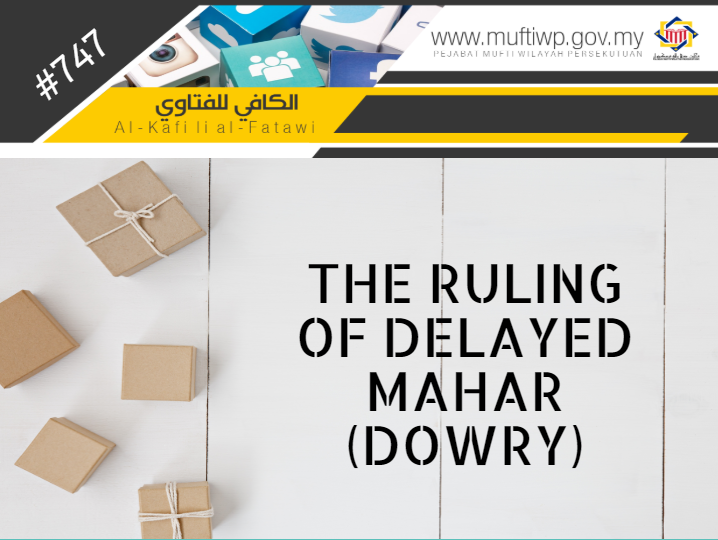Question:
Assalamualaikum wbt,
What is the ruling of a husband to delay the payment of mahar?
Answer:
Waalaikumussalam wbt,
Alhamdulillah, praise and thanks to Allah for the countless blessings He has blessed us all with. Blessings and salutations to the Prophet Muhammad PBUH, his wives, his family, companions and all those that follow his teachings to the day of judgement.
Mahar or dowry is “the obligatory amount of wealth a husband pays to his wife due to marriage.”
Mahar is also known as al-sadaqa and it is an obligation for the husband straight away after the aqad is completed, whether the specific amount is stated or not during the aqad. Even if there is a settlement between the bride and the groom to not mention or pay it, it is abrogated and the mahar will still be an obligation to be paid. Refer al-Fiqh al-Manhaji (4/75)
We have detailed the discussion regarding mahar and you can access the article through the following link: https://goo.gl/YqSwGN
Regarding delaying the payment of mahar, it is permissible. This is stated in al-Fiqh al-Manhaji(4/77):
There are no rules that demarcate the minimum or maximum amount of mahar. Anything that is considered as an asset or is exchangeable for something of value can be considered as a mahar, whether it is a lot or a little such as money or loan, something beneficial such as praying mat, house or giving lessons or a skill. Allah SWT said:
وَأُحِلَّ لَكُمْ مَا وَرَاءَ ذَلِكُمْ أَنْ تَبْتَغُوا بِأَمْوَالِكُمْ
“And lawful to you are [all others] beyond these, [provided] that you seek them [in marriage] with [gifts from] your property,”
Surah al-Nisa’ (24)
The above verse state property (المال) only, without specifying its amount.
The same is stated by the Prophet PBUH:
أَعْطِهَا وَلَوْ خَاتَمًا مِنْ حَدِيدٍ
“Give her something, even if it is an iron ring.”
Sahih al-Bukhari (4741) and Sahih Muslim (1425)
In another hadith of the Prophet PBUH, from Amir bin Rabi’ah RA, he said:
أَنَّ امْرَأَةً مِنْ بَنِي فَزَارَةَ تَزَوَّجَتْ عَلَى نَعْلَيْنِ فَقَالَ رَسُولُ اللَّهِ صَلَّى اللهُ عَلَيْهِ وَسَلَّمَ أَرَضِيتِ مِنْ نَفْسِكِ وَمَالِكِ بِنَعْلَيْنِ. قَالَتْ نَعَمْ قَالَ فَأَجَازَهُ
"A woman from Banu Fazarah was married for (the dowry of) two sandals. So, the Messenger of Allah said to her: 'Do you approve of (exchanging) yourself and your wealth for two sandals?' She said: 'Yes.'" He said: "So he permitted it."
Sunan al-Tirmidzi (1113)
This shows that delayed mahar is permissible if it is agreed by the bride. However, the duration of time for the mahar to be paid should be specified for it is the right of the wife. According to al-Fiqh al-Manhaji:
“There is no set condition stating that mahar should be paid immediately. It is permissible to be paid straight away or delayed some of it before intercourse. However, the duration should be specified. The reason is, mahar is the right of the wife. She has the right to ask for it to be paid forthwith or delayed. If she decides that the mahar is to be paid immediately, then she has a right to refuse intercourse for as long as the husband has not paid her mahar. If it has been agreed that the payment of mahar is delayed, then she no longer has a right to refuse intercourse for she has agreed for its payment to be delayed.”
According to the above discussion, we state the following conclusions:
- Mahar is an obligated payment for a wife after aqad is complete. It can be paid immediately or delayed.
- Aqad without stating the mahar is valid, but it is still an obligation for the husband to pay the mahar to his wife.
- Mahar is the right of the wife. Hence, the wife has a right to refuse intercourse if her husband is unable to pay her mahar if she has asked for it to be paid immediately.
- If the wife has agreed to a delayed mahar, then she no longer has a right to refuse intercourse by her husband. However, the duration for it to be paid should be specified.
Wallahua’lam.


